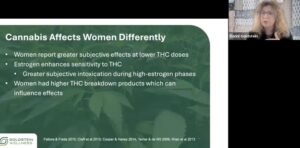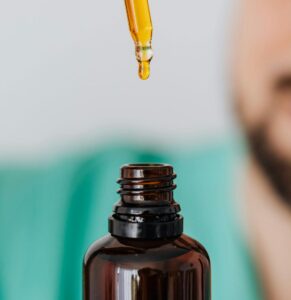Rick Simpson Oil (RSO) is a potent full-spectrum cannabis extract, rich in delta-9-tetrahydrocannabinol (THC). It is most widely known through anecdotal success stories with cancer patients as it was famously developed by Rick Simpson to treat his diagnosed basal cell carcinoma in 2003.
Today it has grown in popularity for potential therapeutic benefits to include: chronic pain management, cancer-related symptoms, and insomnia. As interest in alternative therapies grows for cancer and chronic conditions, scientifically understanding its potential uses in modern medicine increases in importance. This article will look into the history and uses of RSO, while considering its legality, safety, and use guidance.
Who is Rick Simpson?
Rick Simpson experienced a workplace accident as a Canadian engineer in 1997. His role in removing asbestos from a poorly ventilated hospital boiler room led to a series of health issues, including tinnitus and dizziness. Despite its illegal status, Simpson turned to medicinal cannabis use when traditional medications failed to provide symptomatic relief. In 2003, Simpson was diagnosed with basal cell carcinoma, a form of skin cancer. A study published in The Journal of the National Cancer Institute in 1975 finding that THC kills cancer cells in mice encouraged him to develop a cannabis oil. He extracted oil from homegrown plants and applied it to his skin. His anecdotal reports show the cancerous growth on his arm went away in less than a week.
RSO vs FECO vs FSO: What’s the Difference?
RSO may be extracted from any cannabis strain, although indica-dominant strains and those with high levels of THC are preferred. It is produced at high temperatures, using typically alcohol in the solvent extraction method. The end result is a highly potent oil with a molasses-like consistency. RSO differs from full-extract cannabis oil (FECO) in how it is extracted. The traditional method for FECO is using lower temperatures and ethanol or CO2 as a solvent.
Both RSO and full-spectrum oil (FSO) are relatively similar. However, FSO may have a fuller profile of the plant, while RSO may focus more on the THC content; therefore, different cultivars may be utilized for each.
RSO, FECO, and FSO are not commercial brands but rather cannabis extracts. Simpson was very transparent about his journey with RSO and detailed how he produced and used it on his website.
Benefits and Dosing of RSO
RSO may offer various potential health benefits, particularly noted for its use in managing symptoms related to serious medical conditions. It is intended for oral or topical application but may also be made into capsules, suppositories, or edibles, making it a versatile option for those exploring alternative treatments for conditions like chronic pain, insomnia, and various symptoms related to cancer.
Dosing RSO is specific to the individual and should be based on one’s health condition(s), current medications, and additional physiological and psychological characteristics.
Here, we explore RSO’s therapeutic applications and benefits based on user experiences and preliminary research findings.
- Cancer Treatment Support
- RSO is primarily recognized for its potential to assist in cancer treatment. While not a cure, it is used to potentially alleviate symptoms and side effects of cancer treatments, such as nausea and vomiting from chemotherapy.
- Some studies suggest that THC, a key component of RSO, may help in reducing the growth and spread of cancer cells.
- Pain Management
- The high THC content in RSO can be effective in pain relief by interacting with CB1 receptors in the brain and nerve cells.
- It may also reduce inflammation and enhance endorphin release, providing natural pain relief.
- Improvement in Sleep and Appetite
- RSO has been noted to aid in improving sleep quality and appetite, which is notable for patients undergoing intense treatments like chemotherapy.
- Neurological Benefits
- Beyond cancer, RSO is used for managing conditions such as epilepsy, multiple sclerosis, and chronic pain, showcasing its versatility.
- Anecdotal evidence highlights its potential in reducing symptoms of neurological disorders.
- Mental Health Benefits
- Conditions like depression and anxiety may also be managed with the use of RSO, thanks to the anxiolytic effects, which act on serotonin receptors.
Legal Status and Accessibility
Available legally in regions where cannabis is permitted for medical or recreational use, RSO can be found at licensed dispensaries. In the United States, cannabis remains illegal under federal law.
Conversely, in Canada, RSO is legally accessible with a valid prescription for medical purposes. European countries show diverse regulations; for instance, in the Netherlands, cannabis oil can be purchased in coffee shops, albeit with regulated THC levels.
The Need for Caution
- Extremely Potent: RSO is extremely potent due to its high concentration of THC. This potency can lead to significant psychoactive effects, which may not be suitable for all users.
- Lack of Comprehensive Research: Despite the anecdotal evidence, there is a lack of comprehensive scientific research confirming the efficacy and safety of RSO use for various conditions, especially cancer.
- Legal and Regulatory Concerns: The legality of RSO varies by region, given its high THC content. Users must be aware of their local laws to avoid legal complications.
- Possible Side Effects: Due to its potency, RSO can lead to side effects such as dizziness, dry mouth, impaired memory, and in some cases, psychological distress.
- Quality and Consistency Issues: The unregulated nature of RSO production can lead to variability in quality and potency, posing risks to users.
For further inquiries or personalized guidance regarding the use of RSO, please feel free to reach out to our team of dedicated professionals. Our care specialists are available to provide you with free, detailed information and support tailored to your specific needs. You can contact us through the following channels:
- Email Support: Send us your queries to [email protected]
- Phone Consultation: Call us at (719) 347-5400 option 1 to speak to someone. Our specialists are available from 8am to 5 pm MT, Monday through Thursday.
Our team is here to ensure that you receive the most accurate and up-to-date information regarding the safe and effective use of RSO.





